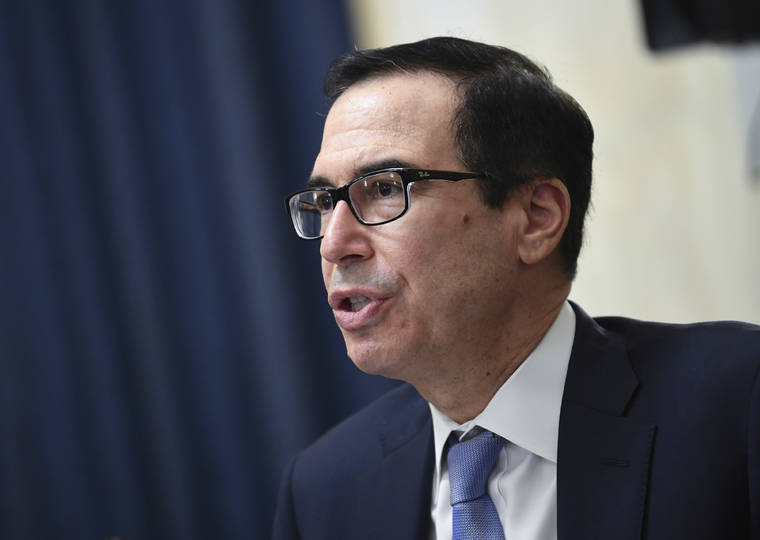WASHINGTON — A House subcommittee investigating billions of dollars in coronavirus aid is demanding that the Trump administration and some of the nation’s largest banks turn over detailed information about companies that applied for and received federal loans intended for small businesses.
The requests Monday came after Treasury Secretary Stephen Mnuchin told Congress last week that the names of loan recipients and the amounts disbursed as part of the $600 billion-plus Paycheck Protection Program are “proprietary information” and do not have to be made public. Democrats say there is nothing proprietary or confidential about businesses receiving millions of taxpayer dollars.
The letters ask the banks, Treasury Department and the Small Business Administration for a complete list of applicants for loans, whether they were approved and details on the guidance Treasury has issued. The subcommittee is also asking for communications between the government and the banks.
Democrats say they are not receiving enough information about the loan disbursements and fear the Treasury Department has favored large, well-funded companies over smaller businesses in underserved communities. In the letters, the Democrats on the House Select Subcommittee on the Coronavirus Crisis request that the banks “take immediate steps to ensure that remaining PPP funds are allocated to those businesses truly in need.”
In the letter to Mnuchin and Small Business Administrator Jovita Carranza, the Democrats urged more transparency “so American taxpayers can understand whether federal funds are helping vulnerable businesses and saving jobs, or are being diverted due to waste, fraud, and abuse.”
The committee, which is headed by Rep. James Clyburn, D-S.C., sent the letters to executives of some of the largest lenders in the program, including JP Morgan Chase, Wells Fargo, U.S. Bancorp, Bank of America, PNC Bank and Citigroup.
In the 10 weeks after the Paycheck Protection Program was launched, the SBA says it has processed 4.5 million loans worth $511 billion. But it has yet to reveal the recipients of taxpayer aid. The agency has only provided general information, such as the total amounts of loans awarded in a given time period.
The loans can be forgiven if businesses use the money to keep employees on payroll or rehire workers who have been laid off.
A spokeswoman for Wells Fargo says the San Francisco-based bank “continues to work as quickly as possible to prepare and submit Paycheck Protection Program applications from our small business customers to the U.S. Small Business Administration.”
As of May 31, 168,000 PPP applications have received SBA guaranties through Wells Fargo totaling $10.2 billion, spokeswoman Jennifer Dunn said. More than 80% of funding is for companies with less than 10 employees and more than half the loans are for $25,000 or less, she said.
Louisiana Rep. Steve Scalise, the No. 2 House Republican and the senior GOP member on the coronavirus subcommittee, said Democrats were “asking questions that have already been answered,” and trying to make that “look like real oversight to hurt President Trump in an election year.”
Lawmakers already know that financial institutions were able to process applications from existing clients more quickly than new clients because of vetting requirements under existing law, Scalise said. The banking industry warned Congress this would happen before the program was approved, he added.
The request by the special oversight committee follows a request by three Democratic House chairs calling for the Trump administration to release the names of businesses that received PPP loans.
“At a minimum, we owe the American people that information,” wrote Reps. Richard Neal of Massachusetts, Maxine Waters of California and Nydia Velázquez of New York. Neal chairs the tax-writing Ways and Means Committee, Waters leads Financial Services and Velázquez heads Small Business.
A spokeswoman for Scalise called the Democrats’s request misguided.
“To retroactively go back now and start naming and shaming businesses is completely counterproductive to the program’s intent,” said spokesman Lauren Fine.
Scalise, in a statement Monday, said the PPP is working as intended: “It was designed to get money out the door and into workers’ paychecks quickly, and that’s what it has been doing.”
———
Associated Press writer Ken Sweet in New York contributed to this report.


